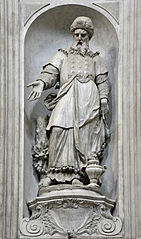In memory of our late father Meshulam Zishe Langerman, who died on the seventh day of Passover, 1973
And Fire came forth from God and consumed them and they died at the instance of God
And Moses said to Aaron, “This is what God meant when He said: through those near to Me I show Myself holy and gain glory before all the people.”
And Aaron was silent (Leviticus 10:2-3).

by Giovanni Maria Morlaiter
18th century
On the eighth day, at the height of the ceremony of sanctifying the Mishkan, a mishap happened and it was followed by tragedy. Aaron’s two sons, the priests Nadab and Abihu, transgressed when they brought forth “before God an alien fire which God did not enjoin upon them”—and the outcome was, “a fire came forth from God and consumed them and they died at the instance of God.” The two priests who brought “an alien fire” died by fire. Measure for measure, they brought (the wrong) fire and died by consuming fire. Torah does not specify the meaning of “alien fire;” there are numerous commentaries on the words “alien fire” “esh zarah” in Hebrew, but the text is quite clear that it was not holy fire, and not in accordance with God’s instructions.
Right after the tragic event the narrative describes the response of their uncle Moses who speaks in the name of God, “Through those near to Me I show myself holy”. Only then does the text offer the response of their father, Aaron. It says briefly and descriptively, “Aaron was silent.”
The order of events in the narrative seems to indicate that Moses was the first to react to the deaths of Nadab and Abihu—rather than their father Aaron. The literal meaning of the text, the peshat, reads Aaron’s response as silence, which seems rather odd in the face of the tragic loss. Was Aaron’s silence perhaps a shock at hearing about the death of his sons? Or was the silence a later response to Moses’ words? It is quite possible that Aaron’s initial response to the tragic news was a horrific painful scream that is not mentioned in the text, and it is only after Moses spoke that Aaron becomes silent—or was Aaron struck by silence right away.
Ramban takes up this ambiguity and claims that Aaron indeed reacted with a cry of sorrow that was not mentioned in the text. Aaron’s silence according to Ramban was not a response to his sons’ death but to Moses’ words. Ramban argues that when Aaron heard Moses he actually stopped his initial outcry. Ramban’s understanding of the text echoes the sages’ edict that “Silence is a form of comfort” and accordingly Aaron’s silence has to be seen as part of comforting, that Moses words calms Aaron in his grief, eases his sorrow.
Abarbanel, on the other hand disagrees and maintains that Aaron’s silence did not follow an initial sorrowful cry but was a numbing reaction to a shocking tragedy: “Aaron’s reaction meant that he became like a silent stone, a father unable to utter a sound in the face of grief and mourning. Aaron accepted no comfort from Moses because his soul and speech left him, and therefore the text spoke for him to describe his inability to speak.”
And the text itself remains silent, not taking sides in the various interpretations of Aaron’s silence; indeed seventy faces to Torah yet many faces to grief and sorrow.